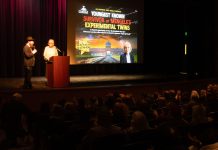It’s Prune pickin’ time in the South Valley.
It’s Prune pickin’ time in the South Valley. That’s Prune with a capital “P,” as in Prune Bowl. That’s when high school football in these parts gets boiled down to its age-old essence, one community pitted against another, as Gilroy and Hollister resume their annual 80-year-old gridiron battle for bragging rights.
But no matter how heated and intense the fabled rivalry between the two local high schools gets, it will always pale in comparison to the barely controlled insanity that is Texas high school football.
As chronicled in the recently released “Friday Night Lights” film, high school football in Texas, like everything else in the state, is larger than life itself. The movie is based on the book by H.G. Bissinger, which was in turn based on the author’s version of real events during the Permian High Panthers’ storied 1988 season.
Rising up out of the dusty backroads of America like the ostentatious stadium that houses the Permian High team, high school football is portrayed as the end-all, be-all of the local town’s existence. (In this case, that town is Odessa, Tx.) Complete with artificial turf, plush locker rooms and enough seating for the entire town, the stadium is featured prominently in the film’s opening shots as a monument to the misplaced priorities of the football-mad Texans.
While based on actual events, the movie is one long allegory. And, its ending is worth the price of admission.
Sure, as with all sports films, it is replete with the usual stereotypes.
The sage coach who tries to teach his players about life.
The quiet, lead-by-example quarterback with the ill, single mother at home.
The abusive father trying to relive his high school football glory days through his reluctant son.
The cocky African American star running back who learns more about life through failure than success.
The second-stringer who becomes a star.
The strong, silent lineman who breaks his silence just in time to deliver an inspirational speech at halftime of the big game.
The undersized smart guy who gets knocked down but gets back up and inspires the team by showing his true mettle when the chips are down.
The preternaturally obsessed fans who incessantly plead, pressure and even threaten the coach and his players in their attempts to win the state title.
And, of course, the matchup of the small-town underdog against the big city behemoth. In the movie, that’s undersized, mostly white Permian against hulking, dominant all-black Dallas Carter.
Tell me you haven’t seen each and every one of those stereotypes in one sports movie or another.
But Friday Night Lights succeeds despite all that because it is about real people, not caricatures.
It succceeds because it tells a real story, unsullied by the vagaries of neatly tied endings.
It succceeds for the same reason the author is no longer welcome in Odessa, because it peers unflinchingly at the characters, based on real people, with all their foibles and shortcomings, and it doesn’t look away or sugar-coat when things gets ugly. This movie doesn’t exactly pick at the scabs of the human condition, but it doesn’t put any make-up on them either.
The simple reaction to such a big-screen spectacle is to rationalize the story and the characters. To say, in effect, that this kind of thing only happened, and could only happen, in that particular time and place. But that would be cheating ourselves out of the insight to be gained from the tale. Because, if we’re honest, we’ve all seen instances when the drive to win in sports – indeed, in life – has smothered basic human decency. Almost certainly it has been on a smaller scale than in Permian, but it happens with chilling regularity in everything from youth sports to the pros.
So, while we can take comfort in the fact that Gilroy-Hollister hasn’t approached the melodrama of Texas high school football, and likely never will, it doesn’t mean we can’t learn from the experience.
And keep our own Friday Night Lights a fun, positive experience for everyone.
Jim Johnson is the Morgan Hill Times sports editor. He can be reached by calling (408) 779-4106 (ext. 203) or by email at jj******@*************es.com













